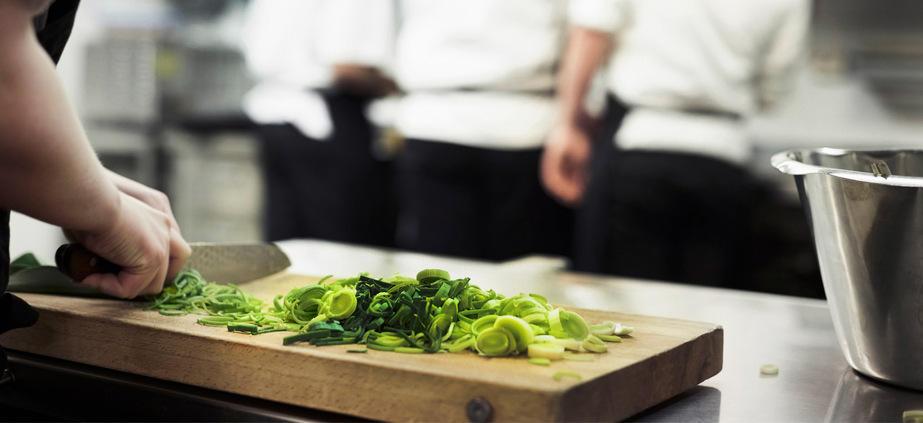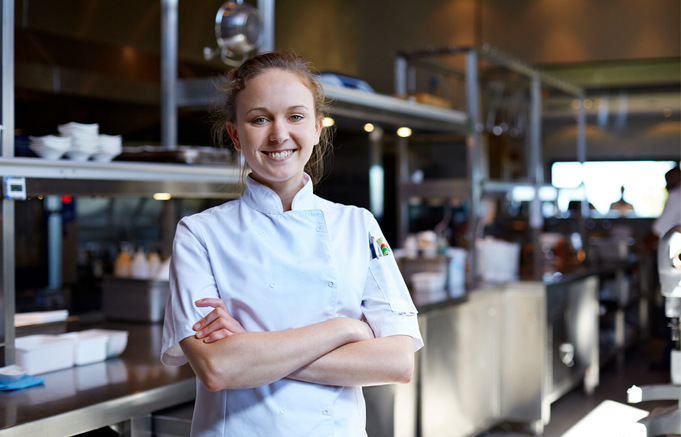What does a sous chef do?

Wondering what a sous chef does? Looking for a career where you can show your passion for food? A sous chef works in the hospitality industry, acting as the second chef in command of a kitchen. Sous chefs work directly under the head chef or chef de cuisine. This means they need a range of varied skills, including team leadership, culinary techniques and organizational capabilities.
If you're looking at culinary careers, becoming a sous chef might appeal to you. However, it's important to understand what being a sous chef actually entails so you know you are picking the right career path. In this article, we'll go over what you could expect to do as a sous chef as well as the skills and qualifications needed to reach this high-level culinary role.
What is a sous chef?
The term sous chef is actually a French term that means under chef. The sous chef is the person who reports directly to the head chef in a professional kitchen. They are professional chefs with extensive experience in the culinary arts and specialist culinary skills who also help run kitchens.
Sous chefs occupy an important place in the kitchen hierarchy. The head chef has to handle a lot of kitchen management tasks, such as financial analysis or sorting out suppliers, so the sous chef will often be responsible for managing other kitchen staff and making sure the head chef's requirements are met.
Under the sous chef, you'll find various station chefs who are all responsible for a certain section of the kitchen, such as sauces or meat. They will report directly to the sous chef while managing junior chefs in their section.
What is the difference between a sous chef and a head chef?
The sous chef is the second-in-command in a kitchen, while the head chef is the leader of the kitchen. Typically, a head chef will do less day-to-day cooking than a sous chef because their role is more managerial. Of course, there is some overlap, and sous chefs will help head chefs with some of their tasks such as menu planning and development.
What are the key differences between a sous chef and an executive chef?

FilippoBacci/E+ Getty iimages
Not all kitchens have executive chefs. This role is usually only found in larger professional kitchens or it could involve managing multiple kitchens at once. An executive chef will do almost no cooking, focusing more on managerial tasks.
How is a sous chef different from a cook?
The main difference between a cook and a chef is the level of training and expertise. Sous chefs have a higher level of culinary arts education and will be capable of more specialized tasks, including management of other kitchen employees. A cook will have more basic training and mostly do hands-on cooking.
Core skills and qualifications
If you want to start a chef career and become a sous chef, you'll need many chef skills in culinary arts and management. You'll also need formal training in the culinary arts.
Areas to focus on for culinary skills development include:
- Proficiency in a wide range of creative cooking techniques
- Food presentation skills
- Knowledge of various global cuisines
- Recipe development, including culinary research and innovation
- Sustainability in the kitchen
- Knowledge of dietary trends in the culinary industry
On top of this, you will need to develop skills for leadership in the kitchen, such as:
- Familiarity with all kitchen operations
- Delegation
- How to maintain a positive work environment
- Time management and organizational skills
- Team leadership and motivation
- Restaurant management skills
- Excellent communication skills
How can I gain the skills and qualifications required to become a sous chef?
Most sous chefs will be expected to have a culinary arts degree from a respected culinary school. This will help get you the skills and experience you need for a career as a sous chef. It's also possible to become a sous chef without formal qualifications, but this would have to happen through a chef apprenticeship and many years of experience in lower roles in the culinary industry. If you want to aim for a sous chef role, getting a culinary degree is an excellent first step.
World-class culinary training
Combine hands-on experience in professional kitchens with learning from experts to launch your chef career with a culinary arts degree.
Sous chef's daily tasks and responsibilities
If you're considering becoming a sous chef, it's important to know what your day-to-day work tasks could look like and what chef responsibilities you’ll have to take on. Sous chefs are required to help manage kitchen staff and help with whatever tasks the head chef or executive chef wants. The exact tasks expected of you will change based on the preferences of the head chef, but they could include the following:
- Menu planning and development: collaborating with the executive chef to create new dishes
- Supervising kitchen operations: coordinating food preparation, cooking and plating
- Managing inventory and supplies: ensuring stock levels and quality of ingredients, acquiring unusual ingredients
- Training and mentoring: guiding junior chefs and helping them develop their skills
- Ensuring food safety and hygiene: implementing and enforcing proper sanitation practices
- Handling administrative tasks: managing tasks such as scheduling, cost control and budget management
What are the challenges of being a sous chef?

Klaus Vedfelt/ Royalty-free via getty images
While being a sous chef can be a great career, it also presents challenges, including:
- Multi-tasking to accomplish all the tasks that go into creating a great restaurant experience
- Short deadlines, especially during service
- Managing a team and keeping everyone motivated and on-task
- Being creative with recipes
Getting a culinary arts degree from a French culinary school will help you embrace all these challenges.
Career path and advancement
You might be curious about career advancement once you've successfully become a sous chef. There are plenty of options for getting ahead in the culinary field, with different paths depending on your interests. The most common route after being a sous chef is to look at a head chef or executive chef position. This would mean taking control of a professional kitchen and overseeing its activities. It often means transferring from a hands-on role to a more managerial one and may require extra study.
What are the other career advancement opportunities for a sous chef?
If you're looking for alternate career paths after being a sous chef, there are plenty of things you can do with a culinary degree, such as:
- Working in culinary education: a lot of successful chefs enjoy creating culinary school programs or training new and upcoming chefs. This can be a rewarding career path without the frantic pace of a professional kitchen
- Consulting: consultant chefs provide guidance and help to restaurants that are struggling
- Private chef: being a private chef lets you advance while still staying active in a hands-on cooking role
- Entrepreneurship: getting experience in a sous chef role can be a great way to get the skills needed to start your own culinary business, such as a restaurant, food truck or catering company.
How can I help my career path as a sous chef?
If you want to make the most of your career and aim for advancement, some steps to take include:
- Staying up to date with culinary industry trends
- Being active in the professional community, because networking is vital to help get jobs
- Building a culinary portfolio to show off your skills
- Winning culinary competitions and awards
- Seeking culinary mentorship from a more experienced chef
All of these can help you stand out from the competition when you look for more advanced roles.
How much does a sous chef earn?

As an advanced chef role, sous chefs can earn a good salary. In the US, a sous chef’s salary is on average around $50,000 per year, though pay can be as much as $66,000 or more. If you're looking at becoming a sous chef as the first step in your career, you could look at making on average $92,000 as an executive chef later on. Sous chefs have a good annual salary to reflect the skills and responsibilities they have.
Sous chef: conclusion
A sous chef is a vital role in a professional kitchen, assisting the head chef with management and overseeing the smooth operation of all the sections of the kitchen. It's also a role where you'll be actively involved in creative cuisine preparation and plating. For this kind of role, you'll need to build your culinary techniques as well as your management skills, which you can do with a formal culinary education such as a culinary arts degree. If you're looking at paths beyond being a sous chef, there is plenty of room for advancement, with opportunities to become an executive chef or start your own business.
Photo credits
Main image: Maskot/Maskot via getty images


